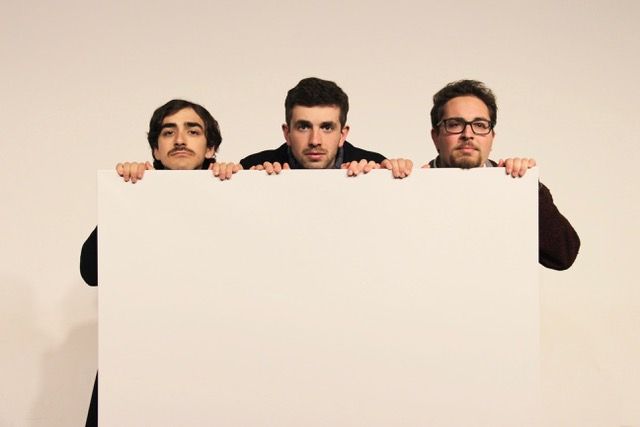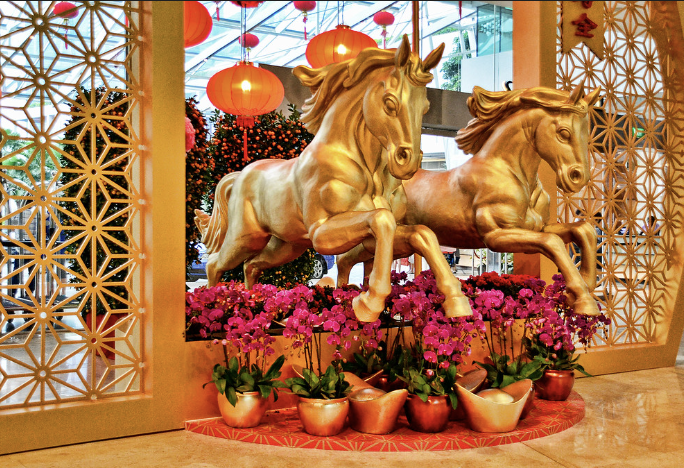“Art”: Ghostlight’s Newest Masterpiece
Ghostlight finished its inaugural season this weekend with the play “Art.” Managing Arts & Living Editor Madeline Lawson ’25 recaps the stellar performances and impressive set design by Amherst’s newest student theater troupe.

Your best friend tells you he’s bought a painting at auction, one of the first steps in his journey to become an Official Art Collector. He urges you to come by and tells you he spent a good portion of his salary on it. He excitedly unveils the painting, only for you to see that it is a completely blank canvas, one you could buy for 10 dollars at an art store.
This is the premise behind “Art,” Ghostlight’s newest theater production directed by Matt Vitelli ’24. Translated from Yasmina Reza’s French script by Sir Christopher Hampton, it had a Parisian feel while remaining American, taking place in the 1990s, but with a present-day tone. While the play’s original intent was preserved, the actors centered the piece in the audience’s context through their mannerisms and portrayal of the characters. Involving only three actors, It was a wonderfully complex play despite its straightforward premise.
Marc (Vitelli) enters, his shadow tall against the wall. In the first of many asides, he speaks directly to the audience about his friend Serge, who just bought a painting that he begs Marc to come and see. The lighting becomes normal, and Marc is no longer a looming presence — he is just a man in a trench coat going to visit his friend Serge.
When Marc arrives at Serge’s (Luke Herzog ’24) apartment, Serge excitedly shows him the piece — a completely white canvas. Marc is baffled, but Serge insists there is more to the piece (“Do you see the lines?” he asks Marc). Marc can’t believe Serge would ever pay 200,000 francs for this and insists it’s an utterly awful piece of art. Serge asks the audience how his friend could possibly not love the piece — Marc asks how he could buy it. Marc says that he has to consult their mutual friend, Yvan, and storms out of the apartment.
When we’re introduced to Yvan (Henry Bassett ’23), he’s upturning chairs and throwing cushions off them before neatly repositioning them. His first words are, “I’m Yvan. I’m intense.” He’s about to get married and has a new job to boot, and he has to find the top of his felt-tip pen, lest the nib dries up. He focuses more on this than on Marc’s complaints, and although he can’t believe the amount of money Serge spent, he will tolerate it if it makes him happy. Marc is personally affronted by this entire debacle. When Yvan says it doesn’t affect him, Marc insists: “It’s doing harm to me!” He encourages Yvan to see the non-painting and talk to Serge, hoping he will begin agreeing with Marc.
Once Yvan goes to Serge’s, they discuss Yvan’s fiancée. He is stressed, but Serge mostly ignores him for the painting, now covered in a white cloth. Yvan shouts with glee when Serge unveils it, saying, “Yes, yes, yes!” over and over. They laugh together because, of course, it isn’t monochromatic. There’s a bit of gray and a different sort of white overlaying the painting. Marc is in the wrong here.
When Yvan returns to Marc, he says that he kind of understands. Not to the extent Serge loves the painting, of course, but he gets it. Marc is unconvinced but finally admits that he should be nicer to Serge.
He goes back over to Serge’s after a few days. All three of them are going to the cinema, but Yvan is late. They keep talking about the painting, and an annoyed Marc shoves pills in his mouth, a homeopathic remedy from his partner Paula. They speak calmly to one another, but when the lights dim for asides, they scream to the audience about the other before returning to their pleasantries.
Once Yvan enters, he paces around the room, complaining about his mother-in-law, his fiancée, his wedding, and everything else in the world, while Marc and Serge sit in silence. It is impossible to pay attention to anything he says, in fact, because he yells for almost five minutes straight with hardly any breathing. Bassett didn’t hesitate for even a moment, giving a rant that caused the audience to burst into applause. He falls back onto the couch, panting, and there is only a moment’s respite before Marc and Serge resume their argument. They make fun of Yvan now, telling him to cancel his wedding.
And while they’re arguing, you look over at the painting. You think you see lines. It is a trick of the light, only shadows, but perhaps they did paint a few white lines on the blank canvas. Maybe the minute shadows are finally rising beneath the paint. You look away and back again. It is a blank canvas. They continue arguing.
The speed and vigor with which both Herzog and Vitelli spoke was impressive. Like Bassett, neither ever tripped on a word nor sounded unsure despite speaking for minutes at a time. Yvan is largely ignored throughout this, but Marc turns on him and calls him a coward for not taking a definite side. Yvan storms off but returns only a minute later, announcing that “Yvan returns!” He lectures Marc and Serge about what he’s learned from his therapist — techniques that have allowed him to speak to Marc without always wanting to kill him.
Serge hides the painting from them, and Marc quips that they’re not worthy to see it. “I can’t love a Serge who bought that painting,” he says, and the hierarchy in their friendship becomes clear. Marc always has some control over them; otherwise, what is their friendship?
Serge and Yvan turn on him and begin insulting his partner, Paula — a woman perfect for him, they say, because he’s not very great, either. The three of them begin to wrestle and the lights turn off, but you can still see their outlines tangled and throwing punches.
When the lights come back on, Yvan screams, holding his ear, and insists that his eardrum is broken. Marc and Serge mostly ignore his complaints. “I don’t resent you being with Paula,” Serge admits to Marc, “but you resent me for being with [my painting].” He replaced Marc, and their friendship is now irreconcilable.
Marc presents an ultimatum to an overwhelmed Yvan, telling him he must choose between them. They goad Yvan into crying, and Yvan falls back onto the couch. They’ve gone too far, they realize, and Serge gives him olives to feel better. The three of them sit together on the couch, faced with the reality that they are no longer friends.
Serge takes the painting out and asks Yvan for his felt-tip pen. He hands it to Marc and motions to the painting. “Go ahead.” Marc bisects the canvas with a red line, drawing a man skiing down a hill. Serge nods, and they leave the painting behind.
Later, Marc and Serge scrub the painting clean. Marc didn’t know that felt tip was washable, and neither did Serge — although, in an aside, he admits otherwise. Marc walks around the painting and describes the scene: white clouds blanketing a snow-covered slope, an image underneath the monochrome.
Other than the stellar performances, one of the strengths of this production was its set design. It took place in Fayerweather’s Pruyne Lecture Hall, a room more typical of an art history class rather than an art-filled personal argument. The tiered seats are only slightly raised, which gave the feeling of sitting in Serge and Yvan’s apartments. You felt like you were the fourth friend watching helplessly as what seemed indelible crumbles around you. I must also give kudos to the lighting design by Stage Manager Stormie King ’25. The lecture hall is not equipped with stage lights, so the lamps were placed in the front row, giving the characters their massive silhouettes during their asides.
This was also Vitelli’s full-length directorial debut. “This was my first time acting in a play that I was also directing,” he said. “While I made the final directing and artistic direction calls, I relied on the input of the other two actors as well as my stage manager and assistant director to help in constructing nearly every aspect of the show.”
Vitelli noted that the choice to produce “Art” was both a personal and professional one: “[Ghostlight’s] mission statement … prioritizes student-written productions; small, intensive shows; and plays in translation. By the end of our second semester, the only one of these categories we had yet to touch was plays in translation.” Vitelli was introduced to the play by his parents and fell in love with the humor and minimal cast. “While ‘Art’ prominently showcases how friendships can become zones of conflict,” he said, “the ending is where the true beauty of the play comes out for me, as Marc delivers his final monologue to the audience.” He said that he was extremely satisfied with the result.
I will admit that I was hesitant about this play. It is 90 minutes with only three actors and a translated script with the potential to sound stilted. But the production value, Vitelli’s directing, and the actors’ performances kept the audience rapt and laughing throughout. This was a fantastic show to close out Ghostlight’s inaugural year.



Comments ()